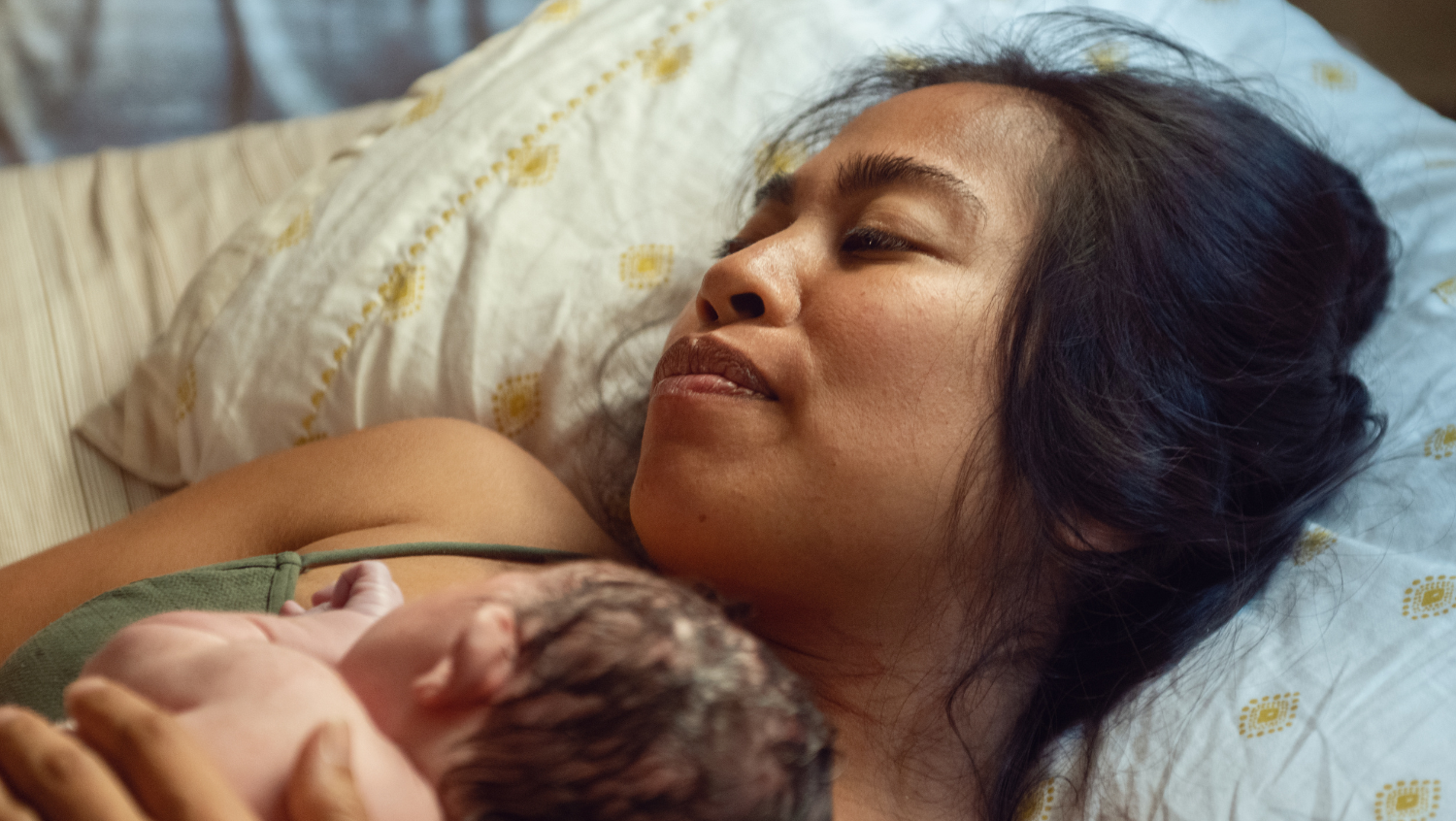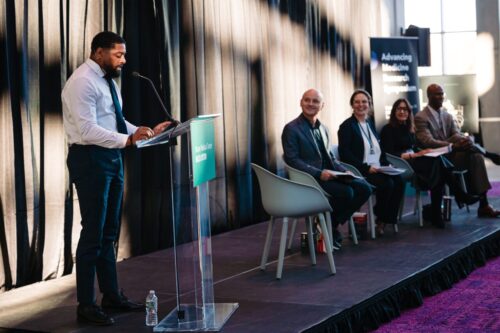Neighborhood Birth Center Plans Move Forward in Roxbury
February 15, 2024

Layland Masuda/Getty Images
Nubian Square birthing center will offer a home-like setting with comprehensive care and programming.
In 1900, nearly all births were at home, with birthing people typically surrounded and supported by a community of family members and midwives. But across the next century, the U.S. saw a dramatic shift away from community and home births, and in recent years, more than 98% percent of births occurred in hospital settings at the hands of physicians. According to a recent report from the Massachusetts Health Policy Commission, as of 2017, 30 of the 44 hospitals in the Commonwealth that provide obstetric care also offer midwifery services. But, the report notes, the midwifery care varied substantially by hospital.
A recent video called “Midwifing Justice” — written by Bostonian Nashira Baril and produced by Birth Center Equity and Sharp As Knives with award-winning artist Molly Crabapple — traces the history of U.S. midwifery, highlighting the traditions of Native and enslaved Black midwives. While midwives around the world have cared for birthing communities for thousands of years, the U.S. medical establishment in the early 20th century pushed for physician-managed births, casting midwifery and community birth as unsafe and unclean.
Coming soon to Boston: The Neighborhood Birth Center
In recent years, the numbers of births occurring at home or in birth centers have been growing. In Massachusetts, just one community birth center exists currently, located in Florence in the western part of the state. But for the past 10 years, Baril has been on a path to change that. The passionate advocate for midwifery and equity in birth options is the daughter and great-granddaughter of midwives, and she has a master’s degree in maternal and child health and 20 years of experience designing public health strategies for justice and equity. She understands firsthand the benefits of midwifery care and what’s possible when physiologic, natural childbirth is supported — she birthed her children at home with midwives, one in Dorchester, the other in Mattapan.
“The midwifery model of care really approaches pregnancy and birth not as an illness or something that requires intervention, but as something that is natural — something that can be supported and facilitated, but not something that needs to be managed,” Baril says. And in birth centers, people can expect longer visits, opportunities to engage the whole family in care, and wraparound services like lactation support, body work, and even counseling for new parents.
“The midwifery model of care really approaches pregnancy and birth not as an illness or something that requires intervention, but as something that is natural—something that can be supported and facilitated, but not something that needs to be managed,” Baril says.
In 2014, Baril first conceptualized the Neighborhood Birth Center (NBC), which began as an idea and a goal of opening a community-oriented birth center in Boston. As she formulated a plan, built a team, and raised money, she navigated various challenges, including regulatory requirements that make difficult everything from staffing to facility design and low reimbursement rates for nurse-midwives and for birth centers.
Since then, Baril’s endeavor has taken big leaps forward. In 2021, Boston Medical Center (BMC) signed an agreement to be the birth center’s transfer hospital — the place birthing patients would go if they needed additional care, like a C-section or or support in emergent circumstances. BMC itself already has incorporated some services a birth center might offer, including its own midwifery team, doula-like services and the CenteringPregnancy prenatal care program. Thea James, MD, MBA, BMC’s vice president of mission, associate chief medical officer, and co-executive director of its Health Equity Accelerator, says a community-located birth center is a complement, not competition.
And after years of fundraising and harnessing volunteer energy to plan for the nonprofit birth center, a capital campaign raised $3 million, enabling NBC to purchase land in Roxbury’s Nubian Square collectively with several other social justice organizations. Now, plans are underway to build the Community Movement Commons, a home for activists and organizers, which will include a 5,000-square-foot, state-of-the-art birth center. The Center itself is slated to open sometime in 2025.
An important part of the model is centering midwives as healthcare providers.
“Midwives are clinically trained,” Baril says. “They’re trained in obstetrics and gynecology, experts in natural birth, and, in addition, can do a whole spectrum of well-woman or well-person care, including menopause care and family planning.”
New funding and partnership with Boston Medical Center
As Baril and her team wait to break ground, the project recently received a boost in the form of a $300,000 investment from the BOS Collaborative, a cross-sector initiative launched in 2021 and housed at BMC. The fund’s mission is to support economic wellbeing in some of the city’s most historically disinvested areas, including Roxbury, Mattapan, and Hyde Park.
“We are investing in small businesses, but in particular, small Black- and Brown-owned businesses,” says Gina Patterson, director of BOS Collaborative. “We thought it was important to invest in Nashira, because she’s a community leader, a Black woman, who really wanted to respond to what she saw in public health data. We need this birthing center in Roxbury, a first of its kind in the city.”
In addition, Patterson says, “It’s incredibly important for our Boston residents, our BMC patients, to have alternatives in health and birthing options. As we see data and statistics around maternal health — especially Black maternal health — a birthing center that is led by a Black woman is essential.”
“We are investing in small businesses, but in particular, small Black- and Brown-owned businesses. We thought it was important to invest in Nashira, because she’s a community leader, a Black woman, who really wanted to respond to what she saw in public health data. We need this birthing center in Roxbury, a first of its kind in the city.”
While BMC’s role as NBC’s transfer hospital is unrelated to the BOS Collaborative funding, it fits into the bigger picture of the partnership between the two organizations. Baril says her team thought hard about which hospital would be an ideal transfer partner.
“We chose Boston Medical Center because of their long history of and commitment to midwifery and their renowned midwifery service. Really, when you transfer to a hospital from a birth center, you’re usually transferring in for some additional support not available at a birth center, like Pitocin or an epidural, and not always for an emergency. Our hope is that more often than not, our clients can transfer to BMC and continue to be cared for by the amazing midwives there.”
She adds, “And then we looked at who in the community has a reputation serving the Black and Brown community, and who’s got the most midwives of color on their staff? And we chose BMC.”
James notes that the birth center funding fits with the hospital’s health and equity goals.
“Having a neighborhood birth center that is intended to create an ideal birthing process has a healing effect for the birthing person and the community,” James says. “There’s a lot of trauma that can occur when engaging with the healthcare system in neighborhoods that have been traditionally disinvested in. When you can provide this level of care, intentionality and respect and rooted in safety, with a community-oriented focus, it’s just healing — because it’s so different from what you might normally experience in this process.”
Baril says having the hospital’s backing could catalyze future opportunities. Baril’s team hopes to break ground this summer and have the Nubian Square birth center up and running by late 2025. Baril is heartened by some recent state policy developments: MassHealth announced in December that a new benefit will cover doulas, and Gov. Maura Healey recently released a set of recommendations on improving equitable maternal health care delivery, a move applauded by maternal health advocates.
“It means a lot to have BMC be an early adopter,” says Baril. “For them to come in early, that’s really significant from a funding and partnership perspective.”
Designing a birth center for racial equity
Of the 400 birth centers across the U.S. today, fewer than 20 are owned or led by people of color, according to the video. Baril will add to that count.
She emphasizes, however, that the center is for all.
“Having a neighborhood birth center that is intended to create an ideal birthing process has a healing effect for the birthing person and the community… When you can provide this level of care, intentionality and respect and rooted in safety, with a community-oriented focus, it’s just healing—because it’s so different from what you might normally experience in this process.”
“There’s sometimes an assumption, based on my identity or based on our majority-BIPOC staff and board and the fact that we’re opening in Roxbury. I’ll hear, ‘Oh, you’re working on a birth center for Black women.’ And to that, I say ‘yes, and, I’m working on a birth center for everyone.'”
But, she says, with a deep understanding of the structural inequities resulting in persistent poor outcomes, her team works tirelessly to center the Black experience in every part of their plans.
“We are birthing a birth center that is explicitly focused on liberation, on creating the best possible place of care and gathering and community and education for Black and queer and trans and disabled and immigrant folks,” Baril says. “And in doing so, it’s going to be an incredible birth center for white ciswomen as well — by designing explicitly to tackle inequity, we birth a better design for everyone.”


